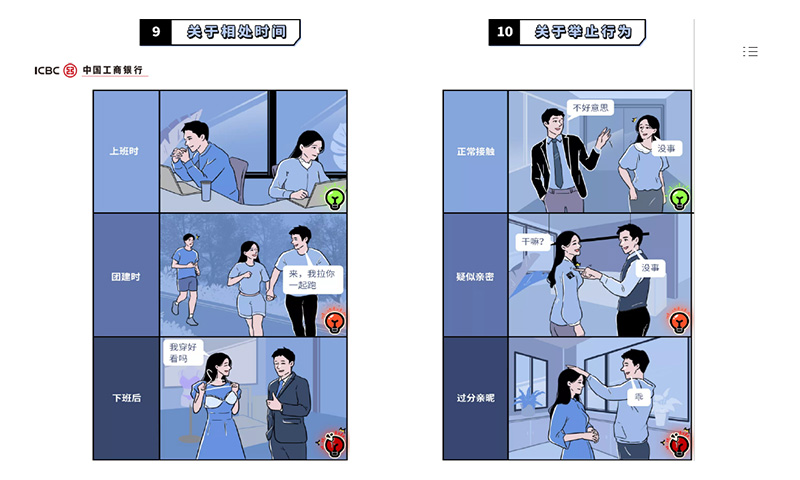State bank ICBC's ‘guide to behavior’ between opposite sex gets mixed reaction online

The guide outlines 10 principles when handling workplace communication between members of the opposite sex involving scenarios such as meals, presenting gifts, and even the use of emojis during online chats. Photo: screenshot of the ICBC guide
"Avoid private meals, avoid physical contact, and avoid intimate interactions in closed environments." A proposal issued by a Chinese state bank on proper conduct between employees of the opposite sex has sparked heated debate online, with some applauding the bank for raising awareness of workplace sexual harassment, while others questioned whether the proposal is too strict or conservative in defining inappropriate behavior.
The proposal was rolled out in late February by the department of innovation research and development of the Industrial and Commercial Bank of China (ICBC), one of the country's largest state-owned commercial banks. The proposal was made public on China's Twitter-like Sina Weibo on Tuesday.
It outlines 10 principles when handling workplace communication between members of the opposite sex involving scenarios such as meals, presenting gifts, and even the use of emojis during online chats.
Each scenario is further illustrated with three different types of behavior represented by green, yellow, or red lights as yardsticks of male and female interaction.

The guide outlines 10 principles when handling workplace communication between members of the opposite sex involving scenarios such as meals, presenting gifts, and even the use of emojis during online chats. Photo: screenshot of the ICBC guide
For example, it is appropriate to have meals and drinks with a group of colleagues, but a private setting between two members of the opposite sex would raise an alert. Furthermore, if one puts food into the other's mouth, it would definitely be regarded as inappropriate.
Similarly, there are also boundaries to ways of helping out a colleague. Picking up a pen from the ground is considered acceptable, while helping a female colleague zip up her dress is seen as crossing a red line.
An ICBC staffer, who requested anonymity, told the Global Times on Wednesday that the proposal was only put forward during an internal discussion of a certain department, which was not a requirement issued by headquarters to the entire organization, and she has not heard of such a proposal so far.
The proposal soon drew widespread attention on the internet, prompting 180 million views and nearly 9,000 discussions on Weibo as of press time.
While some said the proposal is too "old-fashioned" and "conservative" and could complicate interpersonal interactions, some other netizens applauded the act for its resolute attitude to preventing sexual harassment in the workplace, a hot potato issue that has come under the spotlight in recent years.
"The proposal directly pointed out the 'grey zone' in office interpersonal conduct, and will effectively shut down those who cross the line," read one comment.
However, there were some who said that some content of the proposal may be too strict, such as completely ruling out a private meal between two workers of opposite sex.
Against the backdrop of sexual harassment becoming an increasingly serious issue, the new amendment of the Professional Ethics and Code of Conduct for Banking Practitioners released in September 2020 specified that necessary measures should be taken to prevent power being abused to commit sexual harassment among peers.
Global Times

